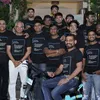[Behind the scenes] Into the nuts and bolts of Yulu, the dockless bike-sharing platform that offers an easy and breezy ride
In an app-ridden world, getting anything from a ride to a safety pin on demand is second nature. Yet, it’s the ‘behind the scenes’ of apps that seamlessly creates synergy. ‘Behind the Scenes’ is YourStory's journey into understanding the precision with which all these dynamics work together.
Getting a ride has never been so easy. Yulu will confirm. Yet, what happens when you click that button? Who actually services your demands? What algorithms are used, and how do experts ensure you get to ride into the sunset, happily?
In the latest series, YourStory goes ‘Behind the Scenes’ to understand the workings of some of the most intriguing tech startups in the Indian ecosystem. In this edition, Yulu - a dockless cycle and electric bike rental startup lets us into their office to peek into how that mere click has behind it an exhaustive set of tasks for each team to give you an easy and breezy ride.

Yulu team
It’s a typical Monday morning at Yulu’s office in Bellandur, Bengaluru, everyone is busy hustling. Even the screens and monitors are in a frenzy with information flowing at breakneck speed - of streets, bikes and pick-up points.
So, what is ‘dockless’? Essentially, it means that you can pick up a cycle or a bike from any of the locations the startup operates in, unlock it with your phone, use and then drop it at the nearest Yulu location - no hassles included.
To us, it looks simple - all at the click of a button. But, a lot is happening on the backend. “You need to have the right mix of technology and on-ground operations to ensure that everything runs smoothly,” says Amit Gupta, Co-founder and CEO, Yulu.
Amit, co-founder and former president (OEM and Telco Solutions) at InMobi began Yulu in 2017 with Naveen Dachuri, RK Mishra and Hemant Gupta. The startup, operational in Bengaluru, Pune, Mumbai and Bhubaneswar, aims to address traffic problems with an IoT solution.
Prior to joining Yulu as a co-founder, Naveen was the enterprise data architect and has been the co-founder of an edtech startup. Hemant, on the other hand, had co-founded a B2B enterprise software startup, and RK Mishra has several decades of experience in public policy.
How it all started?
While operationally involved at InMobi, Amit would often visit China on work. There he came across the tribulations and success of bicycle sharing players like Ofo and Mobike. It has taken these companies close to two years to gain market acceptance and mass adoption. He recalls,
“I had read reports that Didi (cab aggregator in China) reported a 20 percent drop in short trips because of bicycles. There was also an 8 percent drop in fuel sales. Inspired by the success in China.”
Amit dreamt of starting a similar venture that was customised to Indian needs. Read: Traffic snarls, bad roads and too many vehicles.

The Yulu team
To this end goal, he assembled a founding team comprising seasoned entrepreneurs and professionals with deep expertise in core areas. Amit says, “All of them are passionate about making a huge social impact. That is what we need to focus on.”
His pet peeve was, predictably, his commute in a traffic-jammed city like Bengaluru. Amit dreaded his ride from HSR Layout to Indiranagar. When a seven-minute ride starts taking 45 minutes, you know something isn’t right. He couldn’t help but wonder about the growing traffic woes of Bengaluru.
“The time had progressively been increasing from seven minutes, it went up to 15 and then 45 minutes. I felt walking was faster than driving or riding to work,” says Amit. Being his second entrepreneurial stint, Amit studied the market closely. The world around had moved to better, cleaner and greener modes of transport and Bengaluru was yet to catch up.
Amit also reveals that his research and estimates showed that a city like Bengaluru has over 80 lakh vehicles.
All that hard work helped in setting up base operations of Yulu. Now, in their office in Bellandur, the team relentlessly works to ensure a happy balance between human intervention and tech.
They ran the startup in stealth mode for a couple of months before opening operations.
As of today, Yulu has raised $7 million in funding. The startup is expected to raise more funds, and it is backed by investors including Blume Ventures, Binny Bansal, Naveen Tewari and Girish Mathrubootham.
What makes it so easy?
Today, the light blue cycles and electric bikes are visible in some of the top traffic-congested areas in Bengaluru. There are different moving parts that ensure these bikes are available in the right density at each location at the right time.
As consumers, it is ridiculously easy getting a Yulu bike. You can open the app near a Yulu bike, unlock it with a phone and sensor. Registered users can unlock a bicycle by scanning the QR code on bicycles, and ride away. You can also lock the bike with the app.
On the backend, this means the use of mapping algorithms that see patterns and locations of the many zones of low supply-high demand and vice versa, during rush hour. A large flat screen television occupies a corner of the office, where the tech team sits and makes these matches possible.
The screen shows different coloured and patterned lines constantly. It is the Bengaluru city map that holds data and details of all bikes. Each pattern and colour depicts bikes in the space, and the onground team tracks them. “Some are even off the serviceable area, if you see,” says Naveen, cofounder and CTO, Yulu, pointing at a section of the map.
The algorithms leverage GPS data on bikes, and creates “heat maps” of these patterns, and addresses the process by rebalancing; Yulu’s on-ground fleet management team moves cycles manually to areas of high demand.
For payments, Yulu supports Paytm, Google Pay, PhonePe, UPI, and credit and debit cards.
On the security measures to prevent thefts, Hemant demonstrates how a loud alarm goes off if one tampers with the dockless mechanism. On the backend, Yulu’s on-ground team can access the location and intervene, if required.
While this works for ordinary Yulu bicycles, it also works for the newly launched electric bikes Yulu Miracles. While one office corner holds the mapping screen, another holds the prototype of the Miracles. A designer in the corner is furiously sketching models and forms.
Bringing in a miracle
The startup launched its electric scooter, Yulu Miracle, in Bengaluru in the last week of February 2019. With this, the e-bike company aims to provide a scalable, affordable, and green solution for first and last-mile, short-distance commutes.
“We soon realised that the city (Bengaluru) was already polluted, and we should not add to the existing problem,” Amit says, adding that he felt, “scaling the business wouldn’t be easy then.”
This led to the launch of Yulu Miracle. Meant for one commuter, Yulu scooters have a 48-volt motor controller, a maximum speed of 25 km per hour, and they require no licence or helmet.

Hemant, COO and CO-founder Yulu on the bike with the team
Explaining the workings of the Miracle, Hemant says,
“A single charge can take the light-weight bike (45 kg) up to 60 km. The user need not worry about the battery; it has a swappable Li-Ion battery. Like a smartphone, the scooter interacts with the server every five minutes. This helps us know the charge level of every Yulu Miracle being operated across the city. And if required, we send the onground ops team to swap the battery. The team gets an update the minute the battery levels drop below 10 percent.”
The startup has already tied up with local kiranas and mom-and-pop stores in Indiranagar (Bengaluru) to avail space for storing and charging batteries. Users must pay a mandatory Rs 10 for a Yulu Miracle ride, and another Rs 10 per 10 minutes of ride time.
“We procure certain components from China and a local partner assembles them. Our idea is to keep on indigenising the product like Maruti. In the next six months, the whole component, when seen from a value prospective, will be 70 to 80 percent from India. We will not rely on foreign countries,” Amit says.
Decongesting the city
Yulu’s vision is to decongest urban traffic by providing a scalable, affordable, efficient and clean mode of transportation to solve the first and last-mile connectivity and short distance commutes.
Amit estimates that market size of shared mobility space under bicycles is currently close to $8-10 billion globally, and is expected to grow beyond $1 billion in India by 2022. Since mobility needs a high-frequency use case, Amit believes it can be converted into a platform to increase business potential between 5 to 10 times.
(Edited by Suruchi Kapur)


![[Behind the scenes] Into the nuts and bolts of Yulu, the dockless bike-sharing platform that offers an easy and breezy ride](https://images.yourstory.com/cs/2/a9efa9c0-2dd9-11e9-adc5-2d913c55075e/YULU-Featured-Image_YourStory1568108541548.png?mode=crop&crop=faces&ar=2%3A1&format=auto&w=1920&q=75)








